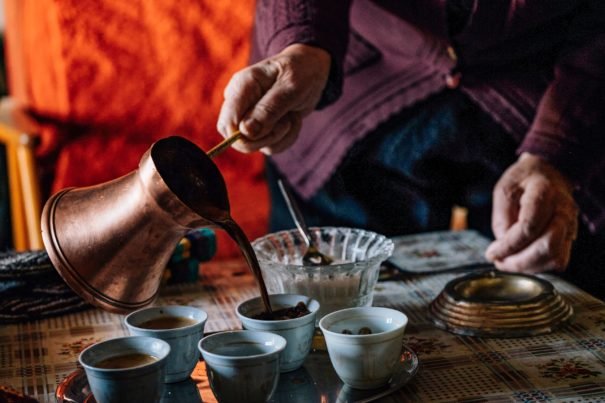
There Is No Journey Too Arduous For a Solid Cup of Coffee

There Is No Journey Too Arduous For a Solid Cup of Coffee
Bosanska kafa in Bosnia
It’s late morning when we pass a huddle of sheep by the side of the road and turn the last rocky corner into Lukomir, Bosnia’s highest-altitude and most remote village. It’s tucked into the side of the Bjelašnica Mountain, home to semi-nomadic Bosniak sheep herders. It’s accessible via a ten-mile hike or by truck on crumbling switchbacks—except in the winter, when the only way to access it is on skis. It’s a cluster of small stone houses: short, squat, and steep to protect from snow.
Off the main road is a mosque with a white minaret and an emerald roof. A sheer cliff with an 870-yard drop marks the end of the village. According to legend, a dragon once lived in this canyon. On this ledge, there also sits what is probably Bosnia’s most remote outhouse.
As we admire the view, a short old woman in a white kerchief appears and tells us to come to her one-room house. “I am the café,” she says.
We enter and remove our boots, as is customary. Sevda welcomes us and wastes no time in preparing the instruments of bosanska kafa: Bosnian coffee. An entrepreneur, she also lays out several pairs of hand-knit mittens for us to purchase. Outside of sheep herding, the village doesn’t have much of an economy.
Sevda heats water on the stove. She pulls out a tin and adds coffee grounds to the hot water in her džezva—a copper pot with a flared base. As the sandy mixture heats on the stove, a caramel-brown foam starts to swirl up from the grounds in the bottom. This is the good stuff: the crema.
Sevda places tiny porcelain cups in front of us, and a dish of sugar. She puts a spoonful of the crema into each cup. Then goes back around and tops them up with coffee from the džezva.
We begin to drink. Bosanska kafa feels like a stew. It’s hot, thick and meant to wake you up. It took me a few tries to learn that you do not drink the last mouthful of your Bosnian coffee. It’s just sediment, and tastes awful.
As l sip my kafa, Sevda shows us a picture of two men on her wall: her family that have left to look for work in Sarajevo, Bosnia’s capital. It’s hard to convince young people to stay and herd sheep when just 30 miles northeast, the city offers opportunities and modern comforts.
On the hillside outside her window, carved, white stećci—medieval tombstones—wink at us in the sunlight.